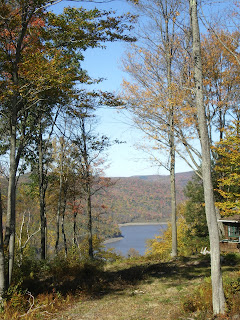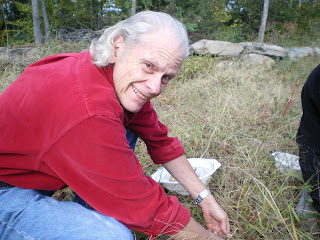Monday, October 18, 2010
Crystal Ridge Spirit
 Doug Enjoys reading - Su Shu the "Four Classics"
Doug Enjoys reading - Su Shu the "Four Classics"The "Four Books" include the following:
The Great Learning
Doctrine of the Mean
The Confucian (Kong Tzu) Analects
The Sayings of Mencius (Meng Tzu)
Although most of the sayings, comments, and philosophy are related to Confucius, they all relate to the Dao De - the "Way of Power" Classic that was composed by Lao Tzu about 500 years BC.
When we are not working around the house, or on the land, in the garden, we enjoy reading.
 View from Crystal Ridge, over the lake, with fall foliage.
View from Crystal Ridge, over the lake, with fall foliage.The changing seasons each have their blessings.
This past year has seen us busy completing exterior work on the house - a stone front wall and stone pavers on the porch and stairs. With the help of our carpenter-friend, Todd, we have used both native stones and composit commercial stones.
Tuesday, March 16, 2010
February and Libraries
Has the Library been buried?
The closest thing to an arbiter of language in the US is national network and cable news. When Murrow, Cronkite or Brokaw spoke, they gave a level of authority to what was considered the "best form" of American English.
But, with the loss of these national Titans, and with the proliferation of 24-hours-a-day cable news and its ever-changing faces, there is no longer any nationally recognized paragon of "prescriptive English" - as opposed to "descriptive English" - that we can reliably refer to.
So, we come to the questions of February and the library.
February is almost everywhere now pronounced as "feb-YOU-ary" rather than "feb-RU-ary."
Likewise, now if you wish to borrow a book, you more often say you are going the the "li-BURY" rather than to the "lib-RARE-y."
It is not just in pronunciation, however, that US English as become less prescriptive. For many years i taught English to non-native speakers - both as a foreign language overseas, as well as a second language in the United States.
One of the most important lessons was on the distinction between "lie" and "lay," between "rise" and "raise," and between "sit" and "set."
"The papers lie on the table," vs. "I lay the papers on the table."
"I rise every morning," vs. "I raise my head every morning."
"The books sit on the shelf," vs. "I set the books on the shelf."
This distinction between "intransitive" and "transitive" verbs is only one area in which grammar keeps a distinction between words, while practice blurs the difference.
The distinction between "I" and "me" and between "he" and "him" or "she" and "her" also seems to have vanished in public usage, and the "subject" and "object" pronouns have been melded into complete interchangeability.
"He and I went," vs. what is often heard, "Him and me went."
"They will bring her and me," vs. what is heard, "Them will bring her and I."
One more: there is the sticky issue of using "a little" or "a few."
"there was a little rain," and "There were a few drops of rain."
When I was a child, my father was a stickler for "proper" English usage. I remember, at the age of about five, hearing him lecturing on the distinction between "I did," and "I have done."
He was a strong advocate of "prescriptive" English: the exact adherence to the "rules." He often explained that his interest in the rules of language was no doubt due to his having been brought up in an age (the early 1900s) when schools routinely taught Latin. As Latin was considered a "dead language," its rules were immutable, and were thus applied to English grammar as an ideal of what language should be.
Due to the current shift in US English usage, it is often only university students who are now expected to follow English language rules when they suddenly become aware of them at the time they are given copies of either Kate Turabian or the "Chicago Manual of Style" to prepare their theses or dissertations.
It is interesting to note that, as English is now becoming (if it has not already become) the principal language of international communication, it is this very flexibility that makes it so adaptive and so applicable across cultures and fields of study or endeavor.
The old saying that, "The Americans and the British are divided by a common language," is not only truer now that it ever has been, but the saying is perhaps the best future for this very assimilative, adaptive, and flexible language.
So whatever you say is the shortest month, or wherever you go to borrow your books, you can be sure that whomever you speak with (oops! I almost wrote "whoever") will still understand - although not always approve of - what you are saying.
Tuesday, March 2, 2010
Ken Follett - "The Pillars of the Earth"

Can a cathedral be the inspirational hero of a novel? Perhaps, if not the hero itself, it can be the setting that frames the lives of several heroes.
Ken Follett’s The Pillars of the Earth chronicles the lives of three generations of men and women who helped build a cathedral in the fictional town of Kingsbridge in 12th century England, during the first 100 years following the Norman Conquest.
Tom, the skilled, but unemployed master builder, penniless and starving with his family wandering the countryside looking for work, obtains the commission to build the cathedral.
Aliana, the daughter of an earl who is dispossessed of his estates during the Anarchy - the civil war that raged between King Stephen and his challenger for the throne, King Henry the Second – survives rape and inspires others by her fierce independence.
Jack, a precocious but wild boy who grows up as an outlaw in the forests, becomes the master builder and continues the cathedral following the killing of Tom.
Ellen, the beautiful, wild woman of the forest (Jack’s mother) whom the monks believe is a witch, holds the other characters together despite her disdain for all ecclesiastic rules.
Phillip, the Prior of Kingsbridge Monastery, ties all of the characters together, and, if anyone, is the central hero.
Nathaniel, Tom’s son, is abandoned when his mother dies during childbirth, starving by the side of the road. He is rescued by Prior Phillip and eventually becomes Prior of Kingsbridge when Phillip is elevated to Bishop.
Although these individuals all exhibit a deep love for humanity – each in a unique way – they appear real through their individual weaknesses and foibles as they struggle against the lawlessness of the Anarchy in which royal, civil, and ecclesiastic leaders wield unrestrained power while contesting each other for total control over the lives of the ordinary citizenry.
The characters interact with various points in history, including the battle in Lincoln, the struggle between King Henry II and the Archbishop of Canterbury, and Thomas Becket’s murder.
Through all their trials and triumphs – the Cathedral is eventually built, and Aliana is restored to her father’s property – the characters in this novel have the unique ability to create an atmosphere which inspires the reader’s spirit as well as entertains the mind.
More information about Ken Follett and “The Pillars of the Earth” may be found on his web site at www.ken-follett.com/
Thursday, February 11, 2010
Cafe Vienna
 "Cafe Terrace at Night," Vincent van Gogh, 1888
"Cafe Terrace at Night," Vincent van Gogh, 1888(Tune from "Adult All-in-One Course-Level 1"
Soft and quiet, in the moonlight,
With the starlight above us;
Sitting with you, by the candles,
All around us is music.
When you listen, you can hear it,
Soaring high, signing deeply;
In your eyes, Dear, shines the love-light
That forever is clear.
Let's go dancing, let's go prancing,
Through the streets of the city;
Let's go singing, let's go ringing,
Let's run gaily through the town.
Glockenspiels chime, carolers all rhyme,
In traditional cadence;
Let us join voice and shout in glee,
With the immortal tunes.
Mozart's house, where in the attic,
He wrote spirit-filled sonnets;
In the park, by Ludwig's statue,
Let our hearts sing their praises,
By the Danube, Opera Platz,
There are mem'ries so precious;
But the best, Dear, is right here, Dear:
You, and Cafe Vienna,
04 December 2009
Wednesday, February 3, 2010
Alpine Melody Lyrics
As Vivian practices the piano, I write lyrics. You may listen to the tune for "Alpine Melody" by searching in YouTube.
(Tune from "Adult All-in-One Course - Level 1)
Yodels echo, 'tween the hills,
Lea and dale - stream and vale;
Let's go hiking, singing clear,
Alpine melodies.
Morning fog cloaks beast and man,
In embrace - mystery;
Tinkling cow bells pierce the dawn,
Cow herds trudge along.
Deer and vixen scurry past,
To their lairs - there to fast
'Till at noontime to emerge,
Foraging anew.
You and I enjoy this scene,
Stand in awe - calm - serene;
Then we wend our trail once more,
Humming Alpine tunes.
17 January 2010
At Crystal Ridge - our 15-acre retreat in the Catskill Mountains - we see scenes that inspire such thoughts. The fog and clear air evoke images of the European Alps.


